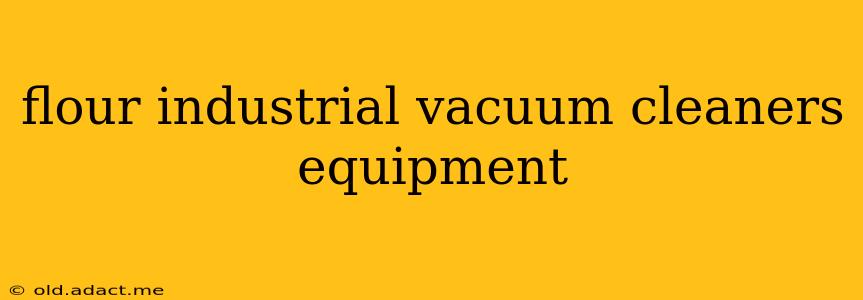Flour dust presents a significant challenge in milling and food processing facilities. Not only is it a nuisance, creating a messy and unpleasant work environment, but it also poses serious health and safety risks, including the potential for explosions. This is why choosing the right industrial vacuum cleaner is crucial. This comprehensive guide explores the essential aspects of flour industrial vacuum cleaners, helping you select the best equipment for your specific needs.
What are the different types of flour industrial vacuum cleaners?
Several types of industrial vacuum cleaners are designed specifically for handling flour dust, each with its strengths and weaknesses. The most common types include:
-
Central Vacuum Systems: These systems are ideal for large facilities. They feature a central collection point connected to various intake points throughout the facility via a network of pipes. This minimizes dust clouds and improves overall efficiency.
-
Portable Vacuum Cleaners: These are smaller, more mobile units suitable for smaller operations or spot cleaning. They offer flexibility but may not be as powerful or efficient as central systems for large-scale flour dust removal.
-
Explosion-Proof Vacuum Cleaners: These are specifically designed to prevent dust explosions. They incorporate features like specialized motors and filtration systems that meet stringent safety standards. This is crucial in flour milling environments where the risk of dust explosions is high.
What are the key features to look for in a flour industrial vacuum cleaner?
Choosing the right vacuum cleaner involves considering several key features:
-
Filtration System: A high-efficiency particulate air (HEPA) filter is essential for capturing fine flour particles and preventing them from being released back into the environment. Some systems use multi-stage filtration for enhanced performance.
-
Motor Power: The motor's power dictates the suction strength and the capacity to handle large volumes of flour dust effectively. More powerful motors are generally needed for heavier applications.
-
Dust Collection Capacity: The capacity of the dust container or collection system determines how frequently you'll need to empty it. Larger capacities minimize downtime.
-
Ease of Maintenance: Regular cleaning and maintenance are crucial. Choose a vacuum cleaner with easy-to-access components for filter replacement and emptying.
-
Safety Features: Beyond explosion-proofing, consider features like automatic shutoff mechanisms, grounded plugs, and clear safety instructions.
How do I choose the right flour industrial vacuum cleaner for my facility?
Selecting the appropriate vacuum cleaner depends on several factors specific to your facility:
-
Facility Size: Large facilities benefit from central vacuum systems, while smaller ones may suffice with portable units.
-
Flour Dust Volume: The volume of flour dust generated will determine the required suction power and dust collection capacity.
-
Budget: Industrial vacuum cleaners range in price, so setting a budget is crucial.
-
Safety Regulations: Compliance with local safety regulations is paramount, particularly concerning explosion hazards.
What are some common maintenance tasks for a flour industrial vacuum cleaner?
Regular maintenance is essential for optimal performance and safety. This includes:
-
Regular Filter Cleaning or Replacement: Flour dust can quickly clog filters, reducing suction. Regular cleaning or replacement is essential.
-
Emptying the Dust Collection Container: This prevents overflowing and ensures efficient operation.
-
Checking for Leaks: Leaks can reduce suction and pose a safety hazard. Regular inspections are necessary.
-
Inspecting the Motor and Other Components: Regular inspections can identify potential issues before they become major problems.
What safety precautions should I take when using a flour industrial vacuum cleaner?
Safety is paramount when using industrial vacuum cleaners in flour-processing environments. Always:
-
Follow Manufacturer's Instructions: Adhere strictly to the manufacturer's safety guidelines and instructions for use.
-
Wear Appropriate Personal Protective Equipment (PPE): This includes respirators, safety glasses, and gloves.
-
Ensure Proper Ventilation: Adequate ventilation helps minimize dust clouds and improves safety.
-
Regularly Inspect the Equipment: Regular inspections help identify potential hazards early on.
By carefully considering these factors and selecting the right industrial vacuum cleaner for your flour-handling operations, you can create a safer, cleaner, and more efficient workplace. Remember to prioritize safety and follow all manufacturer guidelines for optimal results.
